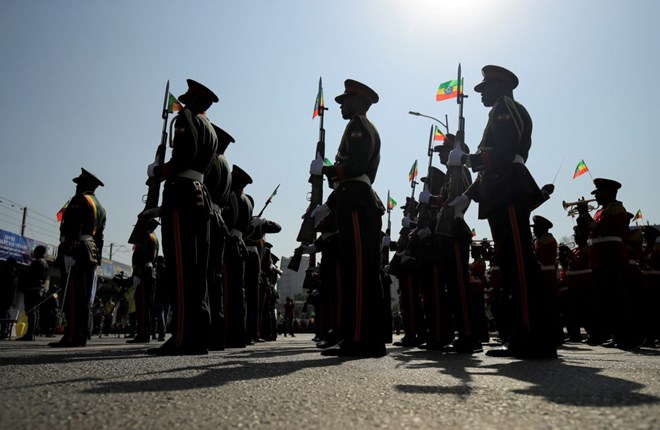
Tuesday November 23, 2021
By Cara Anna

Members of the Ethiopian National Defense Force are seen during a pro-government rally to denounce what the organisers say is the Tigray People’s Liberation Front (TPLF) and the Western countries' interference in internal affairs of the country, at Meskel Square in Addis Ababa, Ethiopia, November 7, 2021. Photo by Tiksa Negeri/Reuters
NAIROBI, Kenya (AP) — A United States envoy said Tuesday he sees “massive progress” in talks with Ethiopia’s warring sides, but he fears it will be outpaced by “alarming” military developments in the yearlong war in Africa’s second-most populous country.
Jeffrey Feltman spoke to reporters after his latest visit to Ethiopia, where rival Tigray forces continue pushing toward the capital, Addis Ababa, and a growing number of countries tell their citizens to leave immediately. Prime Minister Abiy Ahmed on Monday announced he will lead “from the battlefield” in a war that has killed an estimated tens of thousands of people.
Feltman said the warring sides are now talking about elements they expect to see on the table in talks, but “the tragedy is” that while the elements are similar, views differ on which to tackle first.
“Unfortunately, each side is trying to achieve its goals by military force and believe they are on the cusp of winning,” he said.
In a sign of the Tigray forces’ defiant position, a statement issued Tuesday by the Tigray external affairs office said that “first, any peace initiative whose principal objective is to save Abiy Ahmed from imminent demise is dead on arrival.”
The U.S. envoy said the Tigray forces must halt their advance on the capital and warned that their demands might increase as they get closer. The Tigray forces long dominated the national government before Abiy took office in 2018, known for economic development but political repression. They “would be met with unrelenting hostility if they entered Addis today,” Feltman said.
The envoy said Ethiopia’s prime minister told him his priority is to get the Tigray forces out of the areas they now occupy in the neighboring Amhara and Afar regions, and “we share that objective.” Meanwhile, he said the Tigray leaders’ priority is breaking the months-long government “siege” on their home region, which has blocked the delivery of food, medicines and other aid.
Abiy also told the U.S. envoy he’s confident he can push the Tigray forces back to their home region in the north of the country, but Feltman said that “I question that confidence.” He was encouraged, however, that Abiy was willing to speak in detail about what a diplomatic process might look like to stop the fighting.
“There’s no sign there would be direct talks on the horizon between the two sides, nor is that necessary,” Feltman added, saying there are “a whole lot of ways to have political processes” including proximity talks.
Pressing issues include access to deliver humanitarian aid to Tigray and to a growing number of people in Amhara and Afar where fighting has blocked aid.
The World Food Program on Tuesday said it had been granted access to aid warehouses in the city of Kombolcha occupied last month by Tigray forces and found “substantial amounts” of food had been looted. A WFP spokesperson, speaking on condition of anonymity because they were not authorized to give out the details, told The Associated Press they believed the looting had been done by “some elements of the Tigray forces and local population.”
Diplomatic efforts in Ethiopia also are being led by African Union envoy Olesegun Obasanjo, who has not spoken publicly in recent days about his talks that have included trips to the Tigray capital to meet Tigray leaders.
As France, Turkey and others issued calls for their citizens to leave Ethiopia, Addis Ababa authorities tried to reassure foreign diplomats that the city is “in a state of reliable peace,” the independent Addis Standard reported.